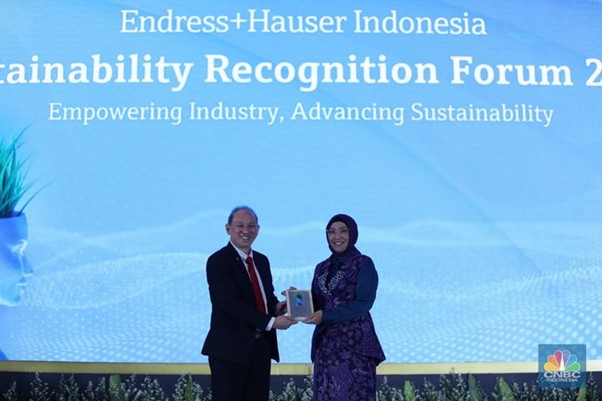EMPOWERING SUSTAINABLE ENGINEERING AT THE ENDRESS+HAUSER INDONESIA FORUM 2025

(Source: www.cnbcindonesia.com)
Endress+Hauser Indonesia recently organized the Sustainability Recognition Forum 2025, a forward-looking event that gathered stakeholders from across the industrial engineering and automation sectors. The forum spotlighted sustainable practices and celebrated companies in Indonesia that have adopted effective strategies for greener, more efficient operations. It served as a convergence point for professionals in measurement, instrumentation, and process automation who are working toward achieving industrial sustainability in a real and measurable way.
This event was not just a corporate initiative but a clear commitment to shaping the future of industrial engineering through environmental responsibility. It provided a platform for collaboration between technology experts, business leaders, and sustainability advocates, highlighting how sustainability and productivity can go hand in hand in today’s competitive industrial landscape.
Forum Theme and Strategic Objective
With the central theme “Empowering Industry, Enabling Sustainability,” the forum aimed to align technological innovation with sustainable development in Indonesia’s industrial sector. It emphasized how data-driven process control and efficient instrumentation can help companies reduce waste, optimize energy use, and meet environmental targets.
The event brought together process engineers, plant managers, automation professionals, and corporate strategists to discuss challenges and opportunities in integrating sustainability into industrial operations. From reducing carbon emissions to improving water and energy management, the sessions underlined the crucial role of smart measurement technologies in achieving these goals.
Through detailed case studies and interactive presentations, participants explored how real-time data from advanced sensors and instrumentation can guide strategic decisions that not only improve performance but also lower environmental impact.
Leadership Remarks and Visionary Insights
The forum opened with insightful remarks from Dr. Henry Chia, President Director of Endress+Hauser Indonesia. He outlined how instrumentation is becoming a vital tool for sustainability in the manufacturing and processing industries. He stressed that accurate, reliable data from field instruments is essential for controlling processes efficiently, reducing energy usage, and minimizing environmental footprints.
Dr. Chia explained that sustainability is not just about reducing emissions, but about making smarter decisions at every level of the industrial process. Whether it’s flow measurement, pressure monitoring, or level detection, the right instrumentation can lead to operational improvements that contribute directly to environmental and economic goals.
In a recorded address, Matthias Altendorf, President of the Supervisory Board of Endress+Hauser Group, echoed this sentiment. He emphasized the group’s ongoing efforts to build sustainability into their products and business models globally. Altendorf shared that the company integrates eco-design principles, such as modular construction and recyclable materials, into its solutions, reinforcing their long-term commitment to the environment and resource efficiency.
Recognizing Industry Leaders for Sustainability
One of the forum’s highlights was the Sustainability Recognition Awards, which celebrated business partners of Endress+Hauser Indonesia for their outstanding achievements in implementing sustainable industrial practices. Among those honored were Clariant Indonesia, Indesso, and PT Nestlé Indonesia. Each of these companies demonstrated measurable results in areas such as energy savings, emissions reductions, and circular production systems.
These awards served not only to honor accomplishments but also to inspire other companies within Indonesia’s industrial ecosystem. Each recognized organization had implemented advanced instrumentation strategies that led to tangible environmental benefits. This included optimizing utility consumption, improving system efficiency, and adopting closed-loop process controls.
For industrial engineers, these success stories provide real-world examples of how integrating process instrumentation and sustainability goals can drive continuous improvement. The awards highlighted the fact that environmental responsibility and operational excellence are increasingly interlinked, particularly in industries such as food and beverage, chemicals, and manufacturing.
Expert Panels and Technical Dialogues
The event featured a series of in-depth panel discussions that offered valuable insights for engineers, plant managers, and sustainability coordinators. Industry leaders including Dr. Henry Chia and Philippe De Meyer, President Director of Bühler Indonesia, joined experts in sharing strategies for implementing green engineering practices using modern process technology.
One of the key topics was how process data from measurement systems can be used not just for operational control but also for strategic sustainability planning. Engineers discussed how to integrate energy-efficient instrumentation into new and existing facilities, enabling predictive maintenance and reducing operational waste.
Another important dialogue centered on cross-industry collaboration. Panelists shared examples of partnerships between technology providers and industrial companies that resulted in significant environmental benefits. These included shared research initiatives, co-development of eco-friendly components, and pilot projects aimed at reducing water and energy usage in critical operations.
The panels emphasized that the transition toward sustainable industry cannot happen in isolation. It requires cooperation between equipment manufacturers, system integrators, regulatory bodies, and the companies themselves to build a robust and scalable model for sustainable growth in Indonesia.
References:
- CNBC Indonesia. (2025). Endress+Hauser Indonesia Sustainability Recognition Forum 2025 (Part 1). Retrieved from
https://www.cnbcindonesia.com/news/20250514180025-8-633332/endress-hauser-indonesia-sustainability-recognition-forum-2025–1-3- - CNBC Indonesia. (2025). Endress+Hauser Indonesia Sustainability Recognition Forum 2025 (Part 2). Retrieved from
https://www.cnbcindonesia.com/news/20250514181603-8-633335/endress-hauser-indonesia-sustainability-recognition-forum-2025–2-3- - CNBC Indonesia. (2025). Endress+Hauser Indonesia Sustainability Recognition Forum 2025 (Part 3). Retrieved from
https://www.cnbcindonesia.com/news/20250514182631-8-633337/endress-hauser-indonesia-sustainability-recognition-forum-2025–3-3-




Comments :